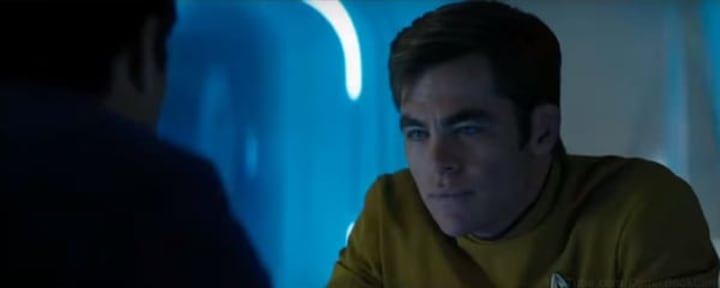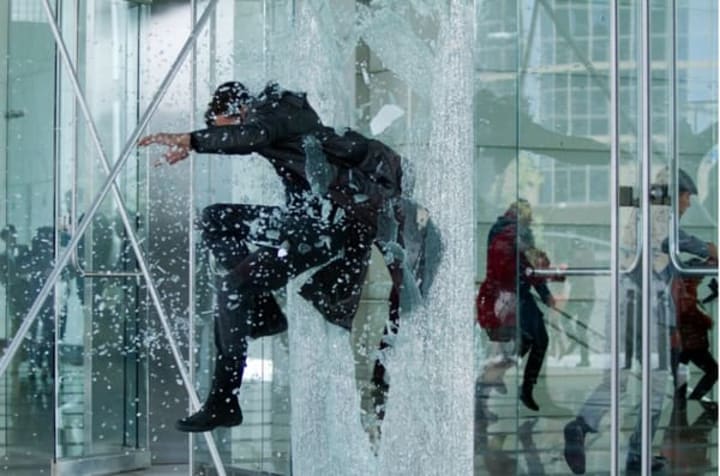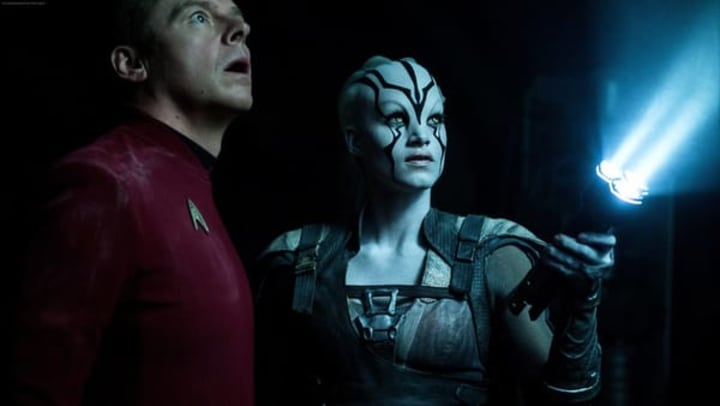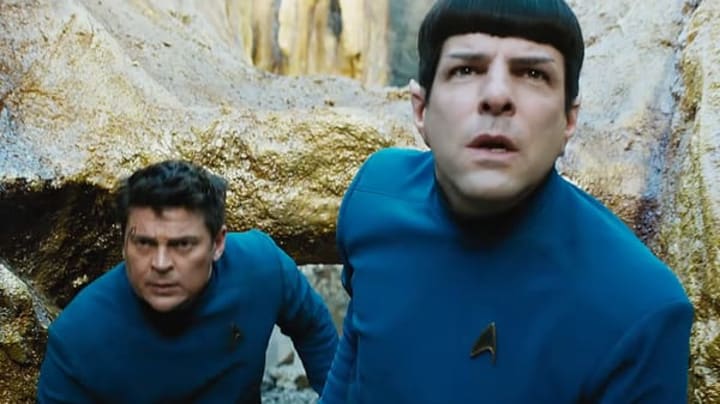
I approached Star Trek Beyond with a curious mix of hope and fear. On the one hand, while the first trailer hadn't impressed me, later TV slots had teased me that the story would have a lot of quality character-work rather than just nonstop action. On the other, I'd come across an interview with Chris Pine - who plays James T. Kirk - that left me infuriated.
What did Chris Pine say?

Kirk reveals his heart. Image: Paramount
The sad truth is that J. J. Abrams's vision of Star Trek has often seemed at odds with Gene Roddenberry's vision. Roddenberry's Star Trek was deeply philosophical, and presented an optimistic and hopeful vision of the future in which the human race had grown up. Greed and hatred had been set aside; differences were valued rather than the subject of fear; peace was pursued rather than war. In Gene Roddenberry's world, science and technology have unlocked the very best of human nature.
Unfortunately, J. J. Abrams's reboot has often ditched the philosophy. Sure, the core ideas have still been there, like a rich vein of gold running below the surface, but the recent films have rarely tapped into them. Instead, they've focused on action, sometimes even to the detriment of characterization. While the films have been beautiful science-fiction adventures, they've not always felt like Star Trek.

Lots of action, not so much thought. Image: Paramount
Defending the franchise, Chris Pine came out with a pretty startling statement:
“You can’t make a cerebral Star Trek in 2016. It just wouldn’t work in today’s marketplace. You can hide things in there – Star Trek Into Darkness has crazy, really demanding questions and themes, but you have to hide it under the guise of wham-bam explosions and planets blowing up. It’s very, very tricky. The question that our movie poses is “Does the Federation mean anything?” And in a world where everybody’s trying to kill one another all of the time, that’s an important thing. Is working together important? Should we all go our separate ways? Does being united against something mean anything?”
As a Star Trek fan - and, frankly, as a fan of science-fiction - I was appalled. I. I wrote an article arguing that he'd missed the point of Star Trek, and frankly missed the very nature of science-fiction. Star Trek has always been so much more than just sci-fi action - and, in truth, science-fiction has always had a lot more power. After all, The Day of the Triffids was powerful in predicting aspects of the Cold War, and Inception is hardly low-brow.
Whenever I go to see a film, I try to set aside my expectations - that way, I can enjoy (or endure) the film in its own right. So, although I had my concerns, I settled down in the cinema to watch Star Trek Beyond and did my level best to forget everything I knew before.
I was in for a real surprise.
My fellow Creator Eleanor Tremeer has written a beautiful article arguing that Star Trek Beyond restores Gene Roddenberry's vision in the best possible way. I couldn't agree more. If you'll forgive spoilers (and if not, don't read on), the film is essentially a battle for the human soul. You have the villain, representing humanity's past; a warrior of yesterday, who fought for glory and honor, and yet - if he continues unchecked - will only bring destruction to today's world. This contrasts with the heroes of the Federation, who stand united, valuing one another for their differences, unwilling to abandon even their newest ally to death.

A new ally - she HAS to return! Image: Paramount
Philosophically, this is a beautiful - and timely - message. If the human race is to mature, then we must abandon the glory of yesteryear, and instead embrace a rich and diverse future. As great as our yesterdays may be, they do not dictate our future; what's more, the attempt to cling to them will only bring destruction.
Gene Roddenberry's Star Trek was a political and philosophical vision of what the human race could be. Today, in a time when religion is used as a rationale for acts of barbarism, in an age when populist politicians once again try to scapegoat and divide us on the basis of race or religion, Star Trek's message is once again profoundly counter-cultural. After Chris Pine's quote, I'd not expected to see much of that vision in Star Trek Beyond. Instead, to my delight, in this film that gold was brought to the surface, exposed for all to see.
It's strange, though. To me, in spite of Chris Pine's comments, the philosophy of this film isn't hidden behind "wham-bam action". Instead, it's exposed for all to see. Pine has argued that 2016 Star Trek can't be cerebral - and has then starred in a film proving just how cerebral it still can be.

Nobody gets left behind. Image: Paramount
I'm delighted to say that this is one film that has surpassed my expectations. For the philosophy and depth of thought, to me it stands heads-and-shoulders above the other films in this rebooted Star Trek franchise. I've learned a pleasant lesson here; don't just react to an interview, wait and see the film. It just might surprise you.
About the Creator
Tom Bacon
A prolific writer and film fan, Tom has a deep love of the superhero genre.






Comments
There are no comments for this story
Be the first to respond and start the conversation.